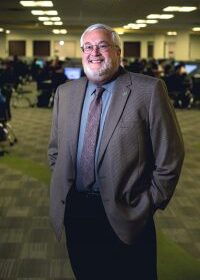Every man a king, or at least he could be
Posted at the entrance of the Republic of Molossia is a list of items prohibited by President Kevin Baugh – catfish, incandescent light bulbs, onions, walruses and anything from Texas (except for Kelly Clarkson).
Located in the desert of Nevada, the Republic of Molossia, according to its website, consists of 6.3 acres of land and is home to 13 citizens – including four dogs and one cat. It is the world’s smallest sovereign republic, and it is one of the world’s many micronations.
Director Jody Shapiro’s aptly titled documentary “How to Start Your Own Country,” which was shown at USF on Thursday, examines that phenomenon. The documentary was inspired by Erwin S. Strauss’s book of the same title.
Micronations have been cropping up since the early 19th century. They are usually established by one individual or group, and though they are not recognized by governments or international organizations, they operate as independent states.
Shapiro traveled to micronations across the globe, from a platform off the coast of the United Kingdom to a rural principality in Western Australia. Along the way, he interviewed the presidents, lords and kings that run these nations.
“If you research or Google ‘micronations’ or ‘how to start your own country,’ there are thousands that pop up,” he said. “They aren’t hard to find, but it was hard to get to them.”
Though these micronations vary in size, population and location, Shapiro said their creators have similar goals in mind. Aside from creating a physical territory, they want to be facilitators for other people to think about a nation ideologically.
One creator of an ideologically-based micronation is USF art professor Gregory Green. Green said he created the New Free State of Caroline in 1996 because he was fascinated with the relationship of individuals to power structures. He said he does not want the responsibility of running his own country, but is trying to challenge what we understand a nation to be.
“It’s the concept of not attempting to change or alter one’s state, but leaving it to create your own state,” Green said. “It’s a conceptual exercise and an aesthetic exercise as well.”
A person can become a citizen of the New Free State of Caroline simply by sending a letter of request to Green. The state has no definite territory, despite Green’s appeal to the United Nations to claim an uninhabited island in the Pacific Ocean.
Some might question whether a nation can be considered legitimate if it has no definite location and is not recognized by other countries or governments, but Shapiro said many of these micronations operate as if they are legally recognized entities.
“They hold themselves to the standards of other countries,” he said. “Going there, getting your passport stamped, reading their constitution, seeing their flag, using their currency – you feel like you’re in a different part of the world.”
Though these nations are often characterized by their eccentricities, a degree of innovation is required to create a self-sustaining nation. Dean Kamen, a.k.a. “Lord Dumpling” of North Dumpling Island off the coast of Connecticut, has created a renewable energy system that allows the three-acre island to operate completely off the electrical grid.
Also, the Seasteading Institute has undertaken an ambitious project of creating floating cities in international waters, outside of the reign of government. According to the documentary, the multimillion-dollar venture aims to create self-governing permanent dwellings on platforms in the high seas.
Margarita Abramova, a junior majoring in mass communications, said she finds it difficult to take micronations seriously because the U.S. government does not recognize them.
“I didn’t know micronations existed, and when I was watching (“How to Start Your Own Country”), I thought it was a complete parody,” she said. “I don’t think it’s political. I think it’s idealistic or social – someone trying to leave their mark on the world or create a utopian society, or a world they could manage and live in and be fully satisfied.”
However, USF alumna Karen Lowman said, with the recent change in the political and economic climate in the United States, citizens need to consider their options.
“There’s no clear definition of a nation,” Lowman, a 1993 graduate with a degree in geography and geology, said. “So, we have the power as individuals to become nations.”
It remains unclear whether ‘nation’ refers to a geographic political entity or simply a community of people who share cultural commonalities. Shapiro said even one of the world’s foremost international organizations is unable to provide a clear definition.
“When we asked the United Nations to define ‘nation,’ they refused,” Shapiro said. “They said they were not an authority on the topic.”






